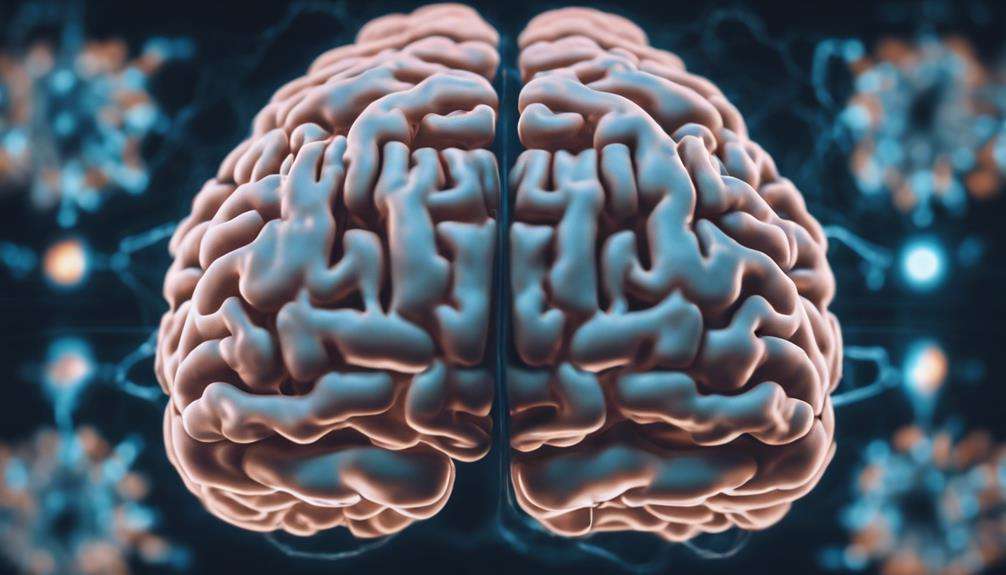Imagine your mind is a garden, and just like any garden, it requires care and nourishment to thrive. Mindfulness practices act as the sunlight and water for your mental garden, fostering growth and resilience.
But why are these practices so crucial in today's fast-paced world? Stay tuned to discover how mindfulness can not only transform your mental landscape but also cultivate a sense of inner peace and well-being that resonates throughout every aspect of your life.
Key Takeaways
- Mindfulness reduces stress, anxiety, and depression, supporting mental health.
- Enhances emotional well-being, fostering connections and positive emotions.
- Improves coping skills and mental clarity through mindfulness practices.
- Scientific evidence supports the significant impact of mindfulness on mental health.
The Link Between Mindfulness and Mental Health
Mindfulness practices have been consistently associated with significant improvements in mental health, offering a promising approach to reducing anxiety and depression. Research indicates that incorporating mindfulness techniques into your daily routine can have a profound impact on your overall well-being. By practicing mindfulness, you can effectively manage stress, cope with challenges, and enhance your emotional well-being. Mindfulness helps you focus on the present moment, allowing you to cultivate mental clarity and improve your ability to cope with difficult situations.
Moreover, mindfulness can increase relaxation, boost self-esteem, and ignite a sense of enthusiasm for life. Studies have shown that individuals who regularly engage in mindfulness practices experience positive changes in their behavior and mental well-being. By incorporating mindfulness into your life, you can develop a deeper understanding of your emotions, reduce anxiety and depression symptoms, and improve your overall quality of life. Embracing mindfulness is a powerful tool for enhancing your mental health and fostering a sense of inner peace.
Understanding Mindfulness and Its Impact
When considering mindfulness and its impact on mental health, it's crucial to understand the tangible benefits it offers.
By engaging in mindfulness practices like meditation or breathing exercises, you can cultivate a heightened sense of awareness and emotional regulation.
Research indicates that these techniques not only reduce stress and anxiety but also enhance cognitive functions, ultimately leading to improved overall mental well-being.
Benefits of Mindfulness
Enhancing your overall well-being and fostering meaningful connections with others, mindfulness practices have been scientifically proven to reduce stress, increase happiness, and improve life satisfaction. By incorporating mindfulness into your daily routine, you can experience positive changes in your mental health and emotional well-being.
Research indicates that mindfulness techniques, such as meditation and sensory awareness, contribute to stress relief and enhanced cognitive functions. These practices not only help you manage challenges effectively but also support you in dealing with mental health issues like depression and anxiety.
Moreover, mindfulness plays a crucial role in promoting heart health and encouraging healthier behaviors. Embracing mindfulness can lead to a more fulfilling and balanced life, where you can navigate various situations with greater ease and resilience.
Practice Techniques
To develop a deeper understanding of mindfulness practice techniques and their impact on mental well-being, exploring various methods like meditation, breathing exercises, and yoga can be enlightening. These mindfulness techniques play a crucial role in enhancing awareness and emotional regulation, ultimately reducing feelings of stress and improving overall mental well-being.
Engaging in mindful activities such as walking, eating, and listening fosters present-moment focus and sensory awareness, contributing to effective stress reduction. By incorporating mindfulness into your daily routines, you can experience positive changes in brain function, behavior, and relationships.
Scientific Evidence Supporting Mindfulness Practices

Numerous scientific studies unequivocally demonstrate the efficacy of mindfulness practices in reducing symptoms of anxiety and depression. Mindfulness techniques have been thoroughly researched, revealing their significant impact on mental health and well-being. Here are three key findings supporting mindfulness practices:
- Enhanced Cognitive Functions: Research has shown that engaging in mindfulness can improve cognitive functions such as attention, memory, and emotional regulation. These improvements can lead to better overall mental health and resilience against stressors.
- Altered Brain Activity: Studies indicate that mindfulness practices are associated with changes in brain activity that support emotional well-being and stress reduction. These neural changes contribute to a more balanced and adaptive response to challenging situations.
- Prevention of Depressive Relapse: Mindfulness-based interventions have been proven effective in preventing depressive relapse and recurrence, even in online settings. This highlights the long-lasting benefits of incorporating mindfulness into mental health care.
Stress Reduction Through Mindfulness Techniques
Mindfulness techniques offer a tangible means to alleviate stress by actively engaging the body's relaxation response. Through regular mindfulness practice, individuals can lower cortisol levels, the stress hormone, leading to reduced feelings of stress and anxiety.
Mindful breathing exercises play a crucial role in regulating the autonomic nervous system, fostering a sense of calm and diminishing the body's stress response. Additionally, practices like body scan meditations aid in recognizing and releasing physical tension associated with stress, promoting relaxation and mental well-being.
Research suggests that engaging in mindfulness enhances resilience to stress, equipping individuals with effective coping mechanisms for life's challenges. By incorporating these mindfulness practices into your daily routine, you can effectively reduce stress levels, improve your overall mental health, and cultivate a greater sense of inner peace and well-being.
Enhancing Emotional Well-Being With Mindfulness

You can enhance your emotional well-being through mindfulness practices.
By engaging in mindfulness techniques, you can reduce stress, anxiety, and depression, leading to improved emotional regulation and increased positivity.
Cultivating self-awareness and positive emotions through mindfulness can help you better manage difficult feelings and promote overall emotional health.
Stress Relief Techniques
When seeking to enhance your emotional well-being through stress relief techniques, incorporating mindfulness practices like deep breathing and body scans can significantly reduce stress levels and promote a sense of calm and balance.
Mindfulness-based stress reduction has been shown to lower blood pressure and improve lipid profiles, benefiting overall health. Additionally, mindful eating and walking are effective techniques for relieving stress and enhancing mental health.
Mindfulness interventions have demonstrated the ability to reduce inflammation markers, which is particularly beneficial for individuals with chronic health conditions. Moreover, mindfulness-based cognitive therapy has proven to be effective in preventing depressive relapse and recurrence, offering long-term mental health benefits.
Self-Awareness Through Mindfulness
Enhancing emotional well-being through self-awareness can be achieved by cultivating a practice of observing thoughts and emotions without judgment. Mindfulness plays a crucial role in increasing self-awareness, allowing individuals to recognize triggers and patterns in their emotional responses.
By being mindful, you can develop a deeper understanding of your emotional states and learn to regulate them effectively. Acknowledging and accepting your emotions without judgment enables you to make conscious choices in how you respond to them.
This heightened self-awareness leads to better emotional management and contributes significantly to your overall well-being and mental health. Practice mindfulness regularly to enhance your self-awareness and emotional regulation, paving the way for a healthier emotional state.
Cultivating Positive Emotions
Transitioning from self-awareness through mindfulness, cultivating positive emotions is a foundational practice for enhancing emotional well-being with mindfulness. Mindfulness practices have been shown to increase positive emotions like joy, gratitude, and compassion, ultimately contributing to emotional balance and stability.
Research indicates that individuals who engage in mindfulness experience heightened feelings of happiness, contentment, and overall satisfaction with life. By regulating emotions effectively, mindfulness helps reduce negative feelings such as anger, resentment, and jealousy. Furthermore, practicing mindfulness enhances emotional resilience, enabling individuals to bounce back from setbacks and challenges more effectively.
Studies consistently demonstrate that mindfulness interventions lead to greater emotional stability and well-being, highlighting the crucial role of positive emotions in maintaining good mental health.
- Mindfulness practices increase positive emotions like joy, gratitude, and compassion, enhancing emotional well-being.
- Research shows that mindfulness boosts feelings of happiness, contentment, and satisfaction with life.
- Mindfulness helps individuals regulate emotions effectively, reducing negative emotions such as anger, resentment, and jealousy.
Improving Cognitive Function With Mindfulness

Incorporating mindfulness practices into your routine can significantly boost cognitive function, including attention, memory, and decision-making abilities. Research indicates that mindfulness enhances cognitive flexibility and problem-solving skills, allowing you to adapt more effectively to various situations.
By engaging in regular mindfulness meditation, you can experience improvements in focus, concentration, and mental clarity, which are vital for enhancing overall cognitive performance. Moreover, mindfulness training has been shown to enhance working memory and information processing speed, enabling you to process and retain information more efficiently.
Not only does mindfulness benefit immediate cognitive function, but it also plays a crucial role in preventing cognitive decline and supporting long-term brain health. By incorporating mindfulness into your daily life, you aren't only sharpening your cognitive abilities but also investing in the well-being of your brain for the future.
Mindfulness for Anxiety and Depression Management
When dealing with anxiety and depression, mindfulness offers effective relief techniques and coping strategies. By promoting emotional regulation and reducing reactivity, mindfulness practices can help you manage the symptoms of anxiety and depression.
Studies have shown that developing a non-judgmental attitude towards your thoughts and emotions through mindfulness can lead to better mental health outcomes.
Anxiety Relief Techniques
Utilizing mindfulness techniques, such as meditation and deep breathing, can significantly alleviate symptoms of anxiety and depression by promoting relaxation and reducing negative thought patterns. When practicing mindfulness for anxiety relief, focusing on the present moment, accepting anxious thoughts without judgment, and redirecting attention to the breath or body sensations can be beneficial.
Studies support that mindfulness-based interventions effectively reduce anxiety symptoms and aid in preventing relapse for individuals with anxiety disorders. By incorporating mindfulness into your daily routine, you can enhance emotional regulation, cultivate a sense of calm, and better manage anxiety and depression. Remember, small steps towards mindfulness can lead to significant improvements in your mental well-being.
- Focus on the present moment
- Accept anxious thoughts without judgment
- Redirect attention to breath or body sensations
Depression Coping Strategies
Engaging in mindfulness practices can empower you to effectively cope with symptoms of anxiety and depression by fostering emotional regulation and diminishing rumination. Mindfulness-based interventions have been shown to be effective in reducing anxiety and depression symptoms.
Techniques like meditation and deep breathing help manage stress and negative emotions linked to depression. Mindful eating and body scan exercises allow you to connect with your emotions and physical sensations, aiding in depression management.
Mindfulness for Better Sleep Quality

Improving your sleep quality through mindfulness practices is achievable by reducing racing thoughts and promoting relaxation before bedtime. Mindfulness techniques play a crucial role in enhancing the quality of your sleep. Here are some ways mindfulness can help you achieve better sleep:
- Deep Breathing: Engaging in deep breathing exercises before bed can calm your mind and body, making it easier to fall asleep and stay asleep throughout the night.
- Body Scan Exercises: These exercises involve focusing on each part of your body, releasing tension, and promoting a state of relaxation that's conducive to good sleep.
- Bedtime Routine: Establishing a mindfulness-based bedtime routine can signal to your body that it's time to wind down and prepare for sleep, leading to improved sleep quality and overall well-being.
Incorporating these mindfulness practices into your nightly routine can significantly impact your sleep patterns, decrease insomnia symptoms, and contribute to a more restful and rejuvenating night's rest.
Mindfulness Practices for Self-Compassion
Mindfulness practices are instrumental in fostering self-compassion by nurturing kindness and understanding towards oneself. By incorporating mindfulness techniques into your daily routine, you can reduce self-criticism and develop a more nurturing attitude towards your personal struggles.
Techniques like loving-kindness meditation are particularly effective in promoting self-compassion and overall well-being. Research indicates that practicing self-compassion through mindfulness can lead to improved mental health outcomes, including lower levels of stress.
Cultivating self-compassion through mindfulness practices equips you with the tools to navigate difficult emotions with more ease and acceptance. Embracing a compassionate mindset towards yourself not only enhances your relationship with your inner self but also positively impacts your external interactions and overall quality of life.
Mindfulness for Overall Mental Wellness

By incorporating mindfulness practices into your daily routine, you can significantly enhance your overall mental wellness by building resilience and promoting emotional balance. Mindfulness is a powerful tool that can transform how you perceive and react to the world around you.
Here are three ways mindfulness can benefit your mental well-being:
- Stress Reduction: Mindfulness practices have been shown to reduce stress levels by encouraging you to focus on the present moment rather than worrying about the past or future.
- Emotional Regulation: By becoming more self-aware through mindfulness, you can better understand and manage your emotions, leading to improved emotional regulation and healthier responses to challenging situations.
- Cognitive Functions: Regular mindfulness practice enhances cognitive functions such as attention span and memory, ultimately sharpening your mental clarity and decision-making abilities.
Integrating mindfulness into your daily life isn't just a trend; it's a proven method for achieving overall well-being and mental resilience.
Frequently Asked Questions
Why Is Mindfulness Good for Mental Health?
Mindfulness is good for mental health because it reduces stress, improves emotional regulation, enhances cognitive clarity, boosts focus, nurtures better relationships, increases self-awareness, promotes better sleep, and enhances overall well-being.
What Is the Importance of Mindfulness Practices?
Incorporating mindfulness into your routine offers stress reduction, emotional regulation, cognitive clarity, and increased self-awareness. It enhances focus, resilience, well-being, and mindfulness. Embrace these practices to nurture your mental health and cultivate inner peace.
What Are the Three 3 Major Benefits of Practicing Mindfulness?
To practice mindfulness, you gain stress reduction, improved focus, and emotional regulation. It enhances self-awareness, relationships, creativity, and cognitive flexibility. You connect mind and body, experiencing benefits that transform your mental well-being and daily life.
What Is the Main Purpose of Mindfulness?
Focus on the present moment, cultivating awareness without judgment. Enhance emotional regulation, reduce stress, and build resilience. Develop self-compassion and improve cognitive function. Mindfulness fosters the mind-body connection, allowing for a deeper understanding of your experiences.
Conclusion
In conclusion, mindfulness practices aren't just beneficial, but essential for your mental health. By focusing on the present moment, you can reduce stress, manage anxiety and depression, improve emotional well-being, enhance sleep quality, and cultivate self-compassion.
Scientific evidence supports the effectiveness of mindfulness techniques in promoting overall mental wellness. Embrace mindfulness as a powerful tool to achieve balance and well-being in your life. It's time to prioritize your mental health and start practicing mindfulness today.






